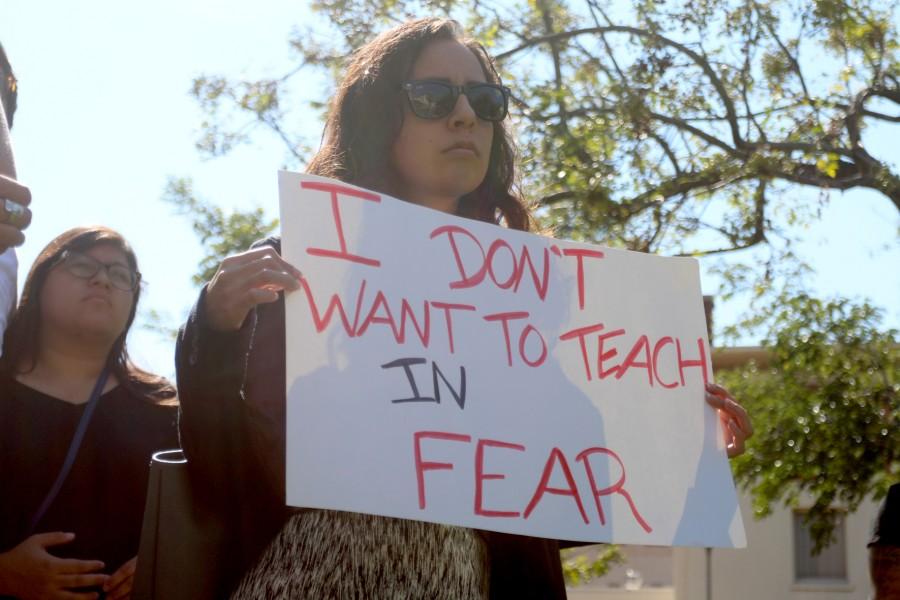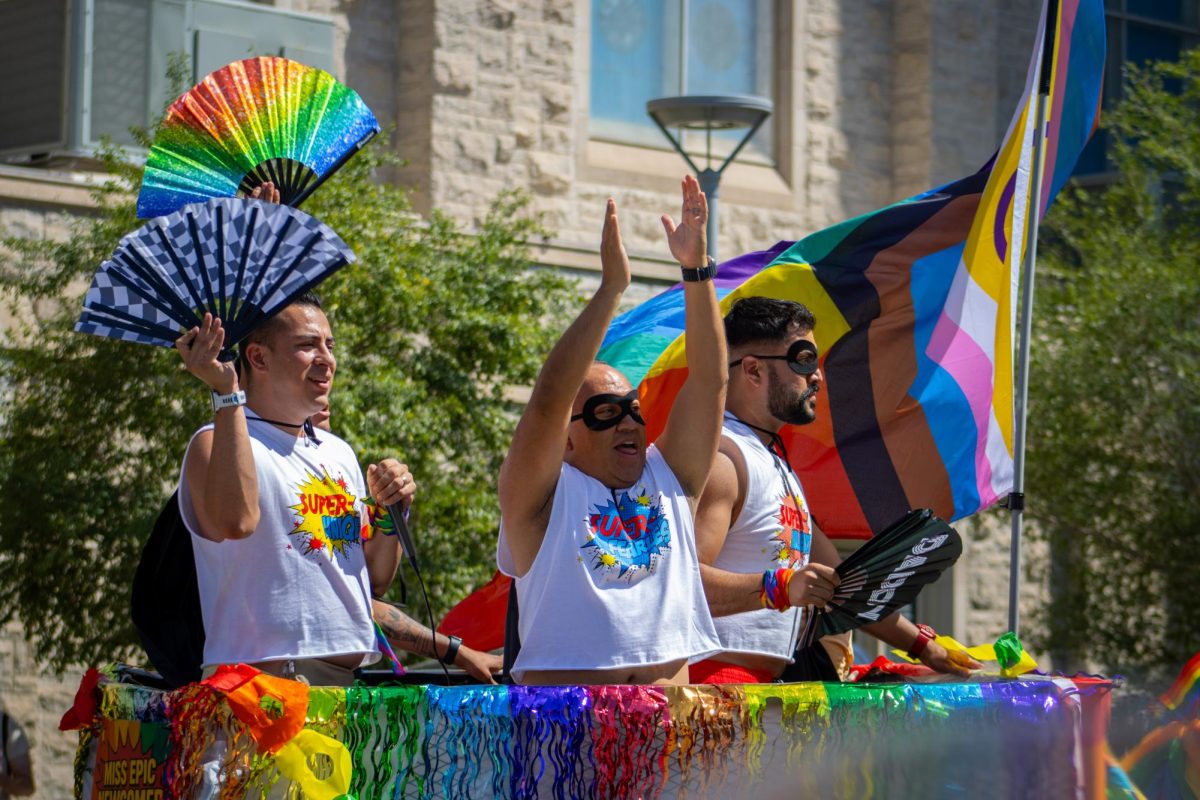Starting Monday, Aug. 1, public universities across Texas will allow individuals to bring handguns on campus if they have a concealed carry license. The law, known as Senate Bill 11, also lets universities set exclusion zones where handguns will not be allowed.
The exclusion zones at UTEP are in areas prohibited by federal law, places where children and underage teens are present, mental health care providers, shared dorms, sporting events, laboratories with volatile chemicals and other locations. The rules also allow individual offices to ban guns at the occupant’s discretion, as long as notice is given orally and they allow meetings outside of their office.
Signs will be hung outside of exclusion zones letting people know that the area is a gun-free zone. For example a sporting event should have a simple message on a ticket as well as an a-frame in front of the event explaining that for the duration of the event it is an exclusion zone. A building or room will have a sign in front as well.
UTEP’s campus carry policy was developed by a task force appointed by UTEP President Diana Natalicio and collaborated between faculty, staff, students and alumni that took over four months to complete. The task force held three campus forums, allowed comments and concerns through email, talked to law enforcement and law experts, collaborated with other University of Texas schools, and contacted universities in Colorado and Utah that have concealed carry laws.
According to Dr. Gary Edens, vice-president of student affairs, UTEP’s task force was one of the largest created for the bill.
“We tried to find representatives of every college. We wanted to make sure we hit all the key players on campus that were going to be affected,” he said “We actually have the largest task force in the university in the state of Texas.”
The controversial law created an outrage from students and teachers alike that sparked protests from UTEP to UT Austin. On Oct. 19, 2015, a rally was held in Leech Grove asking for signatures, and Senator Jose Rodriguez came to show his support. In Austin, the hashtag #cocksnotglocks spread as students brought sex toys to highlight laws that ban sex toys but allow guns.
The ultimate goal of the task force is to create a policy that not only does not change how people feel around campus, but also to create a policy where people don’t notice the new law at all.
“If you came to me on the first day of school and you kept doing everything the exact same way you’ve always done it, then you know we’ve been successful,” Edens said. “Because our hope is that really there’s no change in the way this campus feels at all.”
But not everyone feels that this is possible. Michelle, who wanted her last name to be withheld, is a history major in her senior year, and she said the law is a dangerous move.
“It’s unpredictable. There could be students with mental issues and they could pull out a gun on a teacher or on a TA, so it’s very scary, or another student,” she said. “If they fail a paper, a teacher can get into so much trouble with a student with a gun.” SB 11 goes into effect on the 50th anniversary of the UT Austin tower shooting, where Charles Whitman, an engineering student at UT Austin, brought rifles and shotguns to a tower overlooking the campus and shot 46 people, killing 16 including his mother and wife.
The reaction to the law taking effect on this anniversary highlights the different world views between those who are in favor of the law and those who are against it. During the shooting, armed civilians rushed to the tower in hopes that they could stop Whitman’s rampage. Gun advocates say that future school shootings could be prevented by licensed carriers, while opponents say that school shootings are exactly why guns should be banned in the education system.
Artem Burove, a sophomore majoring in mechanical engineering, said that owning a gun is about protection.
“It’s not just personal protection, it’s also protection of other people,” Burove said. “I mean we have different cases going on in the United States like child molesters or people robbing corner stores–I mean if you’re there and you know how to use a gun I think you should own a gun.”
Retired multimedia journalism professor David Smith-Soto made national headlines when he hung a “no guns” sign outside of his classroom. According to the Texas Tribune, the small act inspired more than 150 UT Austin professors to sign a petition declaring that they will not allow guns in their classroom. Professor Soto has written columns for the Huffington Post and for Borderzine, a website for student work published by the communication department, against the ruling calling, in one Borderzine article, the UT administrators “gutless.”
When asked about Professor Soto’s comments against the law, Edens said he did not know Smith-Soto personally and did not wish to comment, but he did say he expected UT employees to follow the law.
Shawn Carnahan, a freshman majoring in computer science, is for the law, but thinks exclusion zones are necessary in some parts in campus.
“I think that it’s good because the students are able to properly defend themselves if anything were to happen, but I just believe that a gun isn’t necessary in some portions of the campus–like in a learning environment,” Carnahan said. “But I believe that students should be able to have the opportunity, and if they have the permit to carry it and if they have the experience and the knowledge of using the weapon, then I think it shouldn’t be a problem.”
Edens said that the participating public has expressed concerns on both sides of the arguments. Some wished that no exclusion zones be placed in the campus while others said that allowing guns in classrooms can be places where heated discussion takes place and to involve guns means those conversations will be less likely to happen.
University administrators were not silent during the debate, before the law was passed many educational institutions, including the UT System, were fully against the law. Edens said that while they understood the concerns they did not have a choice as to whether or not to follow the law.
“You know UTEP never wanted this law to pass in the first place,” Edens said. “We were vocal about not wanting concealed handguns on campus. We said that, the chancellor of the UT System has a statement saying that. But you know we, again, are a state institution and we follow the law.”
So today, expect to see signs posted around campus designating exclusion zones, but don’t expect to see any guns. The law clearly states that only those with concealed licenses are allowed to bring a handgun on campus. If you do see someone brandishing a gun, call 911 or the campus police at (915) 747-5611.
For more information and a complete rundown of the exclusionary zones, information sheets and other resources, visit the campus carry website. If you want to be involved in the process, you can also leave comments or concerns about regulations at the site as regulations are not set in stone and can change.
Visit the site at http://sa.utep.edu/campuscarry
Christian Vasquez may be reached at [email protected].









